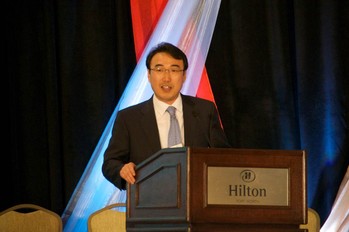Trying to revitalize traditional churches’ mission and evangelism efforts is like trying to make an elephant dance, a renowned global ecumenical leader told the 15th National Multicultural Churches Conference of the Presbyterian Church (U.S.A.) Aug. 2 here.
In a rapidly changing global context, “there is an urgent need for us to reform the paradigms of evangelistic and mission efforts,” said the Rev. Jooseop Keum, a minister in the Presbyterian Church of Korea and secretary for the World Council of Churches’ Commission on World Mission and Evangelism (CWME).
“Mission and evangelism take place today in a radically changing landscape and so should be characterized by radically changing paradigms,” he said.
For instance, when the first CWME gathering was held in Edinburgh in 1910, 70 percent of the world’s Christians lived in Europe and North America. Today, while the percentage of the world’s population that is Christian is the same as a century ago — about 30 percent — 70 percent of them live in the global South.
Other dramatic changes in the last century include threats to the environment, the evolution of the global economy, Keum said, and “the rise of a strong Pentecostal movement, which is now the second largest Christian tradition in the world, just after the Roman Catholics. They have a storng missional fervor — how can we learn from the Pentecostals?”
Keum outlined the new WCC/CWME statement on mission and evangelism, “Together Toward Life,” which he said is characterized by “dynamism and diversity.”
In Asia there is a saying, Keum said: “‘It is difficult to make an elephant dance.’ Our denominational efforts have become an elephant. Let’s see if the Holy Spirit can make this elephant dance.”
Christians believe in the triune God, Keum said, “the God who is constantly seeking to redeem creation; Jesus Christ, whose mission is the redemption of that creation; and the Holy Spirit, who is constantly calling us to the life-giving mission of God.”
Mission “begins at the heart of the triune God … and the love that binds together the Holy Trinity and all of creation,” Keum said. “We should be a community of hope that celebrates the life-giving God and transforms the life-destroying forces in the world.”
This life in the Holy Spirit, Keum continued, “is the essence of mission — a creative gift of God that through the spiritual commitment of God’s people is capable of transforming the world in God’s image.”
The history of Christian mission has been characterized by movement from the demographic center (Europe and North America) to the margins of Africa, Latin America and Asia, “but today is radically different, with the global South leading the way, radically changing the Christian landscape,” Keum said — “a shift of gravity in Christendom.”
Traditional mission concepts of the privileged evangelizing the marginalized are not biblical, Keum insisted. “Those at the margins believe they have been claimed by the Holy Spirit and are the true agents of transformation,” he said. They know that God chose the poor, the foolish and the powerless as His agents, so we must transform our thinking from ‘mission to the margins’ to ‘mission from the margins.’”
We are living in a world in which faith in money threatens the credibility of the Gospel, Keum said. “Global markets through unlimited growth will not save us — only Jesus Christ will save the world.”
The economic salvation myth “is a threat to both the economic life and the spiritual life of all creation,” Keum said. “How can we proclaim Christian values in the global market? If we can’t save souls in the pews, how can we save souls in the market? Do we have our missionaries on Wall Street? This is a serious challenge to our mission and evangelism.”
Though sharing our faith in a radically secularized world is extremely difficult, Keum said, “All churches are called to be vibrant messengers of the Gospel of Jesus Christ — a humble but confident sharing of our faith with all. If we are only sharing the love of Christ within the gated community of the church, we are doing something wrong.”
The church “is the gift of God for the world, not for ourselves, for the living presence of God in the world,” Keum said.
“God uses the whole of created beings for God’s mission without any discrimination,” Keum said. “The church of Christ, then, must become a diverse community, to bring healing and reconciliation, not division, which is not acceptable in any circumstances.”

